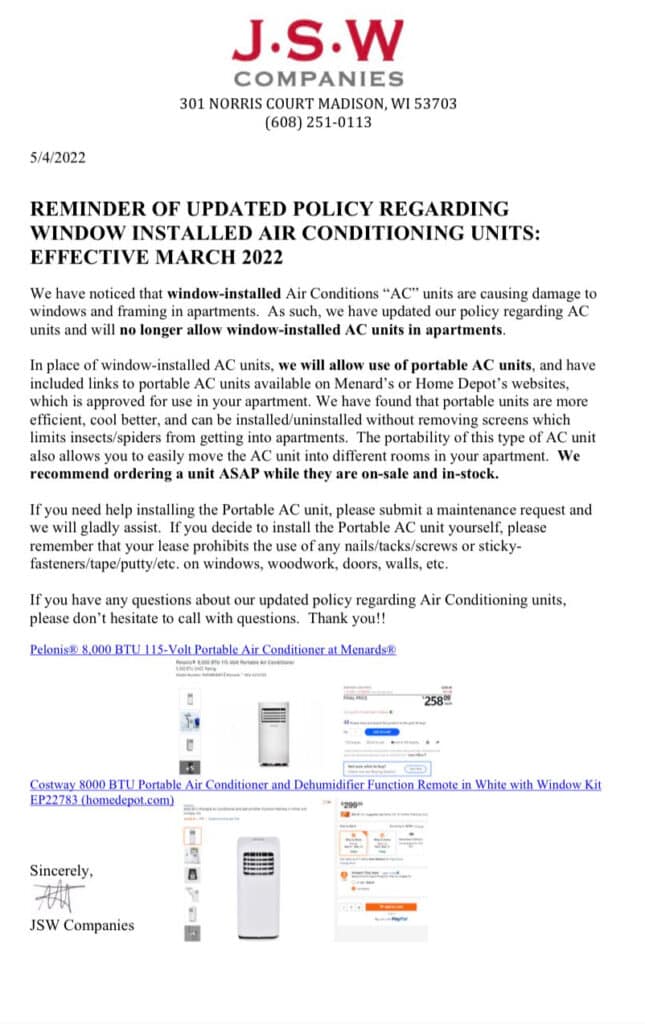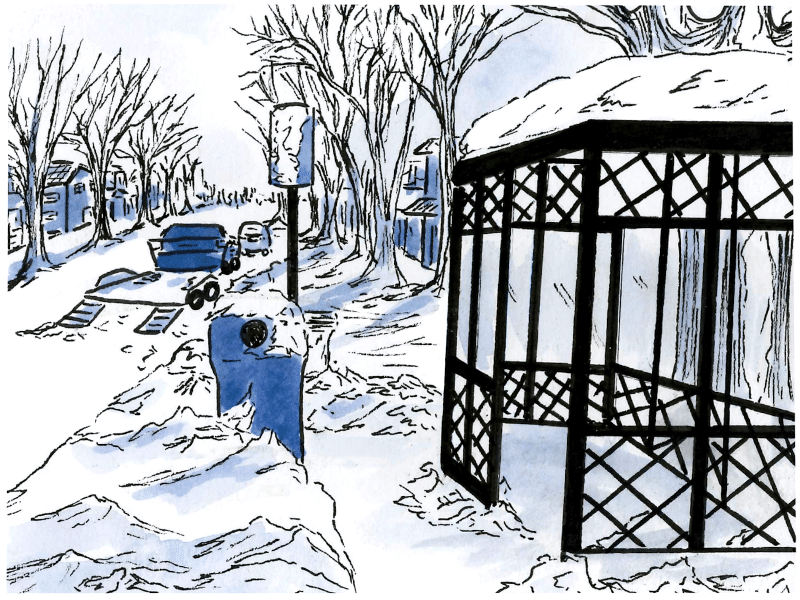
Tenants at Norris Court and other JSW Companies properties were told to buy new, more expensive floor AC units instead.
As Madison sweated through a May heat wave, tenants in one of the city’s oldest apartment complexes were organizing for the ability to keep using window air conditioning units.
JSW Companies, which operates the Norris Court apartment complex in the Tenney-Lapham neighborhood and other properties around the UW-Madison campus and the near east side, sent out a reminder to tenants in May that, effective in March, it had banned window units.
Instead, JSW directed tenants to buy portable air conditioners—the kind that sit on the floor and vent out the window through a tube. The message to tenants suggested a couple of models with links to buy from Menards and Home Depot. I checked the pricing and availability of these specific units on May 13. One, the Pelonis 8,000 BTU 115-Volt Portable Air Conditioner, retailed at the time for $280.99 through the Menards website. You can get it shipped to a local store for free, but when I tried the site in May it estimated that the unit would arrive in eight days. Another, the Costway 8000 BTU Portable Air Conditioner, was listed at $276.98 on the Home Depot website, and would apparently ship to a local store for pickup between May 20 and 25—so, someone ordering it that day would likely have had to wait at least a week.
“We recommend ordering a unit ASAP while they are on-sale and in-stock,” JSW’s May 4 email to tenants adds. The email also offers tenants help with installation.

Temperatures in Madison climbed into the 90s in mid-May, breaking National Weather Service records. Intense and dangerous heat, unusual for early summer, also spiked in late June. The World Health Organization states that “Heatwaves are among the most dangerous of natural hazards, but rarely receive adequate attention because their death tolls and destruction are not always immediately obvious.”
Climate change has made extreme heat more of a pressing public-health issue. A 2019 report from the Union of Concerned Scientists predicted a dramatic increase in the number of days with dangerous heat indexes around the country, including in Dane County. Denser, more urbanized areas including central Madison are also subject to the urban heat island effect. In recent years, even famously temperate areas of the country, including the Pacific Northwest, have been shocked by deadly heat waves.
JSW first started letting tenants know about the policy through emailed announcements in March, though some apparently weren’t aware of it until the reminder email went out in May. In some cases, JSW inserted language barring window units into leases during a recent round of renewal signings; tenants who didn’t read the fine print were later caught off-guard. To make things more complicated, JSW began enforcing the ban while some tenants were still under leases that did not explicitly forbid window units.
The landlord’s email announcements to tenants this spring immediately kicked off outraged online discussion among tenants in a Facebook group for Norris Court residents. Eventually, a group of tenants signed a petition asking JSW to either reverse the policy or to provide some form of rent relief to make up for the cost of buying new units. They requested a response in writing from JSW, but say they have not yet heard a response. Staff at JSW did not respond to requests for comment for this story.
Hardship and heat
Five current renters at Norris Court and other JSW properties on the near east side spoke with Tone Madison, as did one tenant who recently moved out of Norris Court. All of them asked not to be named in this story, citing concerns about retaliation from landlords. Some were lucky enough to be able to afford floor units—though they weren’t thrilled with the performance of these units—and some were toughing it out with fans and open windows. A few have noticed that some of their neighbors are still using window units anyway, openly defying JSW.
“[JSW is] not letting us have our existing units, but they’re mandating that we either have no AC in these buildings or spend $200 without any sort of indication of like rent remission or any acknowledgement that it would be a financial hardship—the cheapest version of the thing they want us to buy is $200,” says one tenant. “And it’s pretty shitty.”
“It’s in the 90s in my apartment, with the windows open,” this tenant told me during an interview in May. They added that taking on the added costs of a new AC unit is a particularly tough ask for the sorts of renters who tend to live in the Tenney-Lapham area: “Especially for the graduate students, to ask that they throw $200 at something at the end of the semester, when they’re not making any more money, is absolutely insane.”
Renters in Madison face increasing financial pressure from rising rents and a low apartment vacancy rate. Adding a surprise $280 or so (and that’s on the cheaper end of the spectrum for a new portable AC unit) to living expenses is tough or downright untenable for a lot of renters in Madison these days. Plus, when that first really hot day of the year comes early, it’s helpful to be able to haul your crummy old window unit out, no matter its disadvantages.
“It is frustrating to drop half a month’s rent on a new A/C when I have a perfectly good one already,” another Norris Court tenant says.
Norris Court and the Tenney-Lapham neighborhood generally are an island of relative affordability amid an increasingly tough rental market. A lot of “young professionals” live in the area, but so do a lot of grad students, and other people with limited incomes.
The complex also has older residents, who can be more vulnerable to heat stress.
Tenants who spoke with Tone Madison also disputed the claim that the new portable units are more efficient and do a better job of cooling apartments than window units. Consumer-testing website Wirecutter reported in 2019 that “Generally speaking, window ACs are more affordable, more efficient, and more effective than their portable counterparts.” The Wirecutter also acknowledged that the comparison can be tricky to make, because federal agencies have different efficiency standards for window and portable units.
JSW’s messages to tenants claim that window AC units are “causing damage to windows and framing in apartments.” But this isn’t necessarily the fault of tenants.
“Even when they were allowed, we had to have them installed by maintenance,” the tenant with the 90-degree apartment says. “So any damage that was happening was because maintenance wasn’t doing it right.” (I rented in a JSW building down the block from Norris Court in 2018, and also recall that JSW had maintenance workers install window units for tenants.)
Several tenants who spoke to me argue that damage to windows can also be chalked up to the buildings’ age, or to a lack of regular maintenance on JSW’s part—and some feel that this is an instance of a landlord offloading the costs of its investment onto tenants. Norris Court and some of JSW’s other properties date back to the early 20th century. Norris Court units especially have lots of windows—they could be accurately described as sunny apartments—and many of those are older windows that aren’t energy efficient. All of this compounds the difficulties of keeping an apartment cool.
“The so-called ‘historic’ windows that JSW is trying to preserve are terribly insulated and constantly let in hot air,” another Norris Court tenant says. “The sheer number of windows means a lot of heat enters the apartment on a warm day. Even with our blackout curtains drawn and the floor unit running constantly, it will remain at 80-85 degrees, according to the thermometer in our apartment. We are purchasing another floor unit at $300, bringing the total AC equipment that we need for our apartment to $600 for a small apartment.”
This tenant suggested a compromise: If JSW is concerned about limiting damage to windows, it could designate a specific window or windows in each apartment where AC units can go. “I’m looking at our windows right now and they’re just filthy, really old, like pulley system windows,” they added. “And some of them, the ropes are broken, so they don’t really function very well.”
An outgoing tenant in another JSW property also questions just how much floor units will prevent window damage as compared to window units. “The floor or portable ones require you to use screws in the woodwork to have them attached correctly,” the outgoing tenant says. “So I’m not sure that that’s any better for the wood, to be honest.”
Another Norris Court tenant was frustrated that they didn’t realize until after the fact that they had signed a lease prohibiting window units.
“In March was when we got the notice that we weren’t allowed to use window units anymore. And going back through that new lease that they had offered us, we realized that the policy had changed in that lease,” the tenant says. “And they hadn’t pointed that out or anything to us when we signed the lease for next year.
“There wasn’t really much of a discussion about the lease at all,” they added. “They slipped a new lease under everybody’s door and said, you know, ‘Re-sign by whatever date just to let us know,’ but there was no note about anything that had changed or anything like that. We didn’t realize that there was that change in the lease until we had gotten the policy note in March and went back and looked at that lease.”
The law provides little help for keeping cool
Tenant organizing in Madison has been an uphill battle, and residents in JSW’s properties might not have very much legal recourse. Wisconsin’s landlord-tenant laws give renters some protections when it comes to heating in the winter, but less so cooling in the summer, as a page on the Tenant Resource Center’s website explains. State statute does require a landlord to “Keep in a reasonable state of repair all equipment under the landlord’s control necessary to supply services that the landlord has expressly or impliedly agreed to furnish to the tenant, such as heat, water, elevator, or air conditioning.”
But that isn’t helpful if an apartment comes without AC included, and tenants are buying their own AC units. Renters in a property that already has central AC or a landlord-provided window unit would have way more recourse.
Mitch (yes, just Mitch), a clinical law professor at the University of Wisconsin Law School and director of the school’s Neighborhood Law Clinic, points out that state law doesn’t require air conditioning in rental properties, but does require “a specific amount of ventilation which can be accomplished by windows or other mechanical systems (such as air conditioning). So, insufficient ventilation could be a code violation (and a health and safety issue). People should contact the city building inspector if they believe they have insufficient ventilation.”
Under Wisconsin law a tenant could theoretically break a lease and refuse to pay the remaining rent by arguing that the lack of adequate cooling impacts their health. Still, the TRC’s website notes, this claim is a “tricky one to prove.” Ultimately, the landlord could still come after the tenant for rent payments in small claims court, and it would be up to a judge to accept the health argument or not.
Mitch adds that a specific tenant in a specific unit could make a legal argument based on their particular circumstances and needs—maybe the ventilation and heat in a particular unit is worse than another in the same building, maybe a given tenant can show that they need to maintain a certain temperature indoors for medical reasons. In other words, the legal landscape around this is very “it depends” and case-by-case.
And under the best legal circumstances, the legal process moves slowly, while the stresses of summer heat and financial hardship are immediate. Tenants in JSW’s properties say they’re still waiting for the landlord to offer some kind of solution. As one tenant puts it: “What do you do when there’s radio silence on the other end?”
Who has power and what are they doing with it?
Help us create fiercely independent politics coverage that tracks power and policy across Wisconsin and the Madison area.



